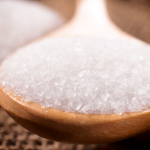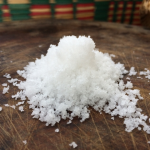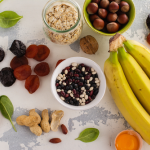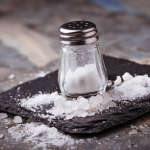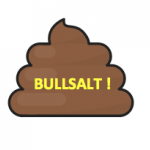“Drinking eight glasses of water every day can prolong your life for up to 15 YEARS and slash the risk of heart attacks, strokes and dementia, study suggests” Can that be true? The study was all over the media, but even a cursory read shows that drinking water was never measured, and eight glasses a day was never discussed.
sodium
Although governmental and medical advisories warn the population to "eat less salt" on the theory that this will help deal with hypertension, there are some holdouts who avoid giving such wholesale advice. That includes ACSH, and a Doctor of Pharmacy who says it's sugar, not salt that is the root of all (vascular) evil. And, he says, we should eat more salt. Who to believe?
Reducing sodium consumption to ward off hypertension, stroke and heart disease has been the goal of nutritionists for many years. They warned that much of the sodium intake comes not from the salt added at the table, but from processed foods. But a new study indicates that the sodium content of such foods has decreased over a recent 15-year period.
There are probably few, if any, nutritional advisories that are as hotly debated as the appropriate level of sodium intake for healthy adults. Yes, the Dietary Guidelines and the American Heart Association recommend an upper limit of 2,300 mg sodium per day (about a teaspoon). But some new research is being added to the literature indicating that level of restriction may be too strict.
In most people's minds, high blood pressure is undoubtedly linked to salt intake. But there's another mineral that should also be considered — potassium. A recent review of several types of studies strongly indicates that it's not just a proper sodium level that helps one achieve, and maintain, normal blood pressure.
The group World Action on Science and Health has declared March 20-26 to be Salt Awareness Week. They're encouraging everyone to decrease salt consumption to reduce the risk of hypertension, heart disease and stroke. But a recent analysis suggests that this advice may be too broad a brushstroke for the majority of people.
Does road salt turn female tadpoles into male frogs? A group from Yale says it does. We say, "Bullsalt!"
American Council On Science and Health: How Toxic Is Salt?
With a recent mandate in New York City that restaurant chains label menu items containing more than the recommended daily allowance for salt, the American Council on Science and Health has tackled the issue with a short consumer-level book.
NEW YORK - Feb. 26, 2016 - The New York State Supreme Court recently upheld a New York City law requiring restaurants to put a special label on menu items containing more than "the recommended daily allowance" for salt.
Two unnecessary instances of how government is trying to tell the public what they should, should not, and must do, to keep healthy: (1) mandatory GMO labeling is the way to go, and (2) too much salt, is, well, too much, and some restaurants must warn patrons of that.
The new Dietary Guidelines for Americans have just been published, and there are some positive moves as well as some of the same-old recommendations that have yet to be shown to be effective. Dietary advice always brings a variety of dissent and assents, so we thought we'd add some of our own.
Sodium restriction has been used to help treat heart failure for many years. But new data suggest that the strategy may not be effective in preventing either additional hospitalizations or death. Could it be that salt isn't the villain we've come to think it is?
With a new law passed Wednesday, New York City has become the first jurisdiction in the country to require salt labeling on chain restaurant foods that exceed 2,300 milligrams. However, don't expect it to improve public health, and the science suggests that the measure might actually harm consumers.

